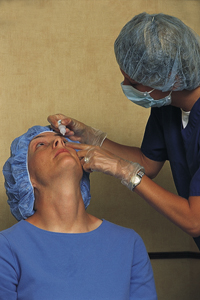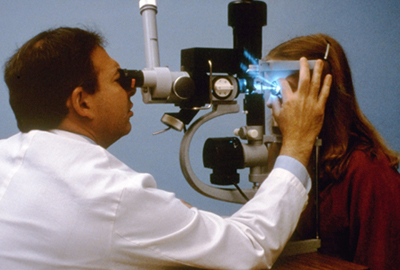Laser Treatment for Diabetic Eye Disease
In the first three phases of diabetic retinopathy, you will require no treatment unless you have macular edema. Your primary objective would be to prevent the progression of the disease through careful management of your blood sugar levels, blood pressure, and cholesterol.
However, if your diabetic retinopathy progresses to the proliferative stage or to clinically significant macular edema, you will be treated with a type of laser photocoagulation.
For proliferative diabetic retinopathy, pan-retinal photocoagulation helps to destroy the damaged structures in the retina. Because this treatment works better before the fragile new blood vessels start to leak, the National Eye Institute notes that it is important for diabetics to have regular, comprehensive dilated eye exams. While it may still be possible to use pan-retinal photocoagulation depending on the amount of bleeding, the earlier corrective treatment is begun the better.
In this procedure, done at all of our five offices, a special laser is used to treat the peripheral area of the retina. This treatment indirectly seals leaky vessels and prevents the formation of the chemicals which cause neovascularization or new blood vessels to be created.
|
During the treatment, your eye will be numbed with anesthetic eyedrops. A special lens will focus the beam of light onto your eye. You may feel some slight discomfort and you will notice flashes of bright light.
A special lens will keep your eye from moving while the laser is being used. The laser treats the middle and peripheral parts of the retina to prevent loss of central vision. Your vision may be blurry following the treatment, which can take between 30-45 minutes. The doctor can only work on one eye at a time, and two or more treatments may be required in each eye.
Following the surgery, your vision may be blurry, but will gradually improve. Rarely, however, in some patients, there can be a permanent loss of peripheral (side) vision. This peripheral vision is sacrificed to preserve your remaining central vision. On rare occasions, your night vision may be diminished, so you should use caution in driving.
|
You will not be able to drive home following the treatment. Therefore, you should make transportation arrangements. In addition, you may want to bring your sunglasses, as your eyes will be dilated for this procedure.
How Is Macular Edema Treated?
Macular edema is also treated with a laser in a type of treatment known as focal laser treatment. This treatment uses a laser to treat areas of leakage in the macula. The fluorescein angiogram test helps determine whether the laser will be applied in a grid pattern or directly to microaneurysms. By reducing the amount of fluid as well as fluid leakage in the retina, focal laser treatment reduces the edema or swelling in the macula.
Focal laser treatment is done in all of our five offices. During the treatment, your eye will be numbed with anesthetic eyedrops. A special lens will focus the beam of light onto your eye. You will feel little or no discomfort, although you will notice flashes of bright light.
A special holder will keep your eye from moving while the laser is being used. The laser treats the macula of your eye, and the ophthalmologist takes special care to avoid the fovea, the part of the macula responsible for central vision. Your vision may be blurry for a few minutes following the treatment. The doctor can only work on one eye at a time, several weeks apart. You may require more than one treatment in each eye.
Following the surgery, your vision may be blurry but will gradually improve. You will not be able to drive home following the treatment. Therefore, you should make transportation arrangements. In addition, you may want to bring your sunglasses, as your eyes will be dilated for this procedure.
Focal laser treatment stabilizes your vision. In fact, the National Eye Institute (NEI) notes that this type of treatment reduces the risk of vision loss by 50 percent. Often though, once your vision is lost, it is unlikely to be improved by laser treatment.
NEI also comments as follows: “Laser surgery and appropriate follow-up care can reduce the risk of blindness by 90 percent. However, laser surgery often cannot restore vision that has been lost. That is why finding diabetic retinopathy early is the best way to prevent vision loss.”


